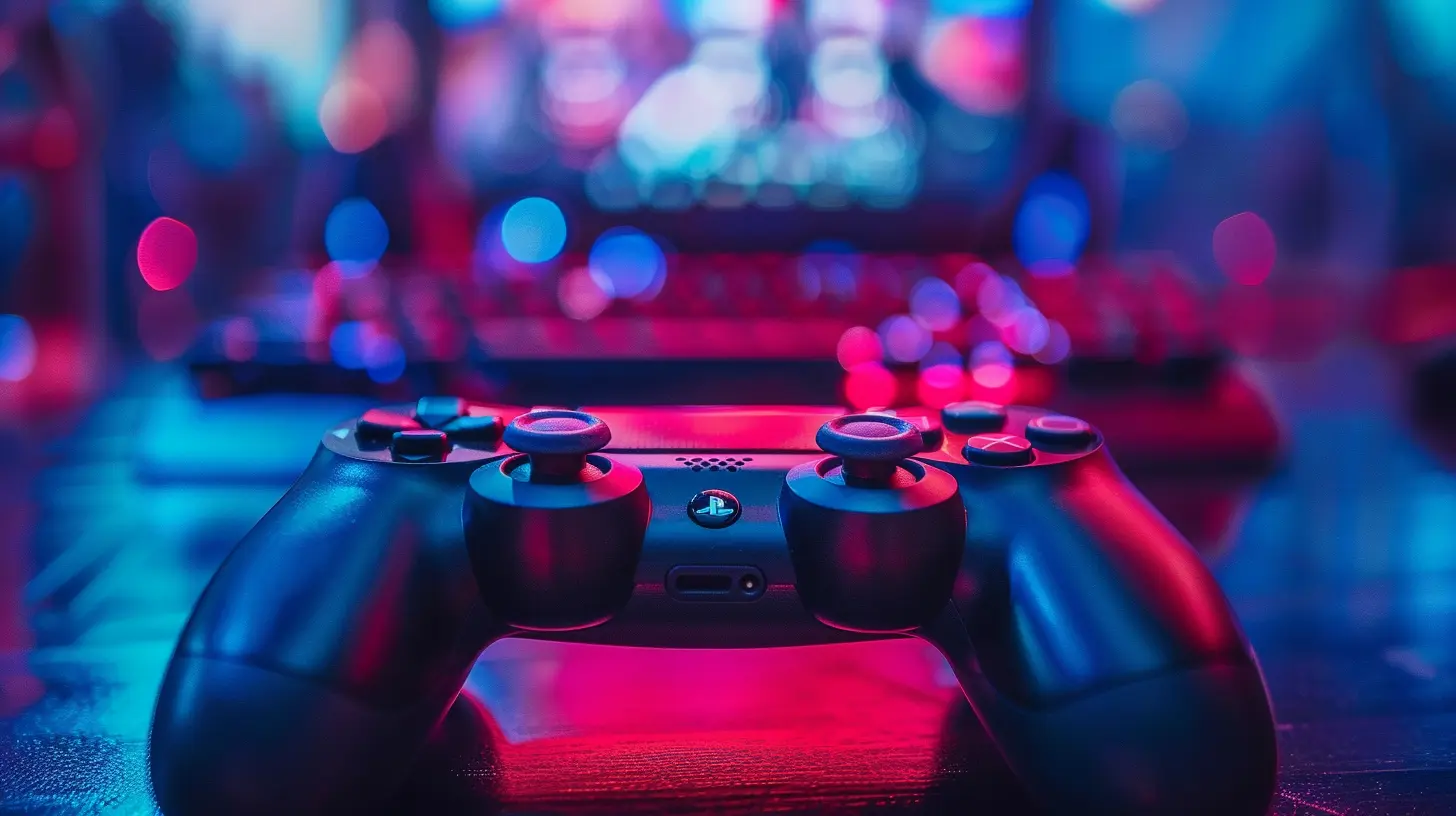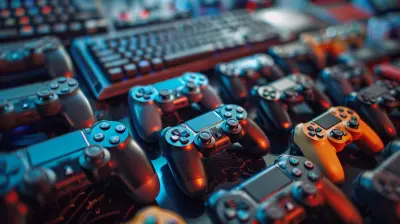6 February 2025
Alright, let’s talk about something that gets every gamer’s heart thumping faster than a boss fight on one HP: high-stakes tournaments. If you’ve ever found yourself in a sweaty-palmed, adrenaline-fueled match with your reputation, a shiny trophy, or—let’s be honest—your sanity on the line, then you already know the psychological chaos that comes with it. It’s not just about who has the sickest aim or the fastest APM (Actions Per Minute, for the uninitiated); it’s about what’s happening in that beautiful, messy brain of yours.
So, pull up a chair (or adjust your gaming chair’s lumbar support), and let’s break it down. Why do some players rise to the occasion like they’re main characters in an anime, while others crumble faster than a Jenga tower at a toddler’s birthday party? It’s all about psychology, baby. 
High-Stakes Play: The Digital Colosseum
Let’s be real for a second—high-stakes tournaments are essentially the modern-day gladiator battles, except with less blood and more sweaty headphones. Whether you're battling solo in a Fortnite showdown or coordinating with your team in League of Legends, the stakes feel monumental.Why? Because it’s not just a game anymore. There’s pressure. From yourself, your teammates, your Twitch chat spamming “EZ,” and let’s not forget that mom who still doesn’t understand why you spent $300 on a custom mechanical keyboard.
In these moments, your brain isn’t just processing the game—it’s juggling a cocktail of emotions, from fear of failure to the thrill of competition. And let’s be honest here, for most of us, it’s like trying to land a triple backflip on a pogo stick. 
The Fight-Or-Flight Gamer Edition
Remember learning about that whole “fight-or-flight” thing in school? Yeah, well, it doesn’t just kick in when you’re being chased by a saber-toothed tiger; it also happens when you’re staring down a 1v1 in Counter-Strike: Global Offensive. Your body doesn’t know the difference between a real-life life-or-death situation and a virtual one. Pretty wild, huh?What happens is your brain starts pumping out adrenaline, which is great for reacting to danger but not so great for, you know, thinking clearly. Ever notice how your hands feel like they’ve been replaced with spaghetti during a clutch moment? That’s adrenaline saying, “Hey, you’re welcome,” while completely ignoring the fact that you actually needed coordination, not chaos. 
The Choke Artist Phenomenon
Ah, choking. The bane of every competitor’s existence. It’s that moment when your brain seems to forget how to function, and you start making the kind of mistakes you’d never make in casual play. Suddenly, your Overwatch Widowmaker can't hit a shot, your Rocket League car is flipping wildly out of control, and your friends are contemplating disowning you.So why does choking happen? Blame overthinking. When the stakes are high, your brain starts focusing too much on the “don’t mess up” part, which ironically makes you mess up. It’s like telling a cat not to knock over a glass—you’re basically guaranteeing it’ll happen.
The cure? Easier said than done, but staying in the moment is key. Focus on how to win, not on the possibility of losing. Essentially, you gotta Jedi mind-trick yourself: “Do or do not. There is no try.” (Thanks, Yoda!) 
The Mental Gymnastics of Staying Calm Under Pressure
Believe it or not, staying calm in high-stakes matches isn’t just reserved for the gaming gods. Regular plebs like us can master the art of keeping our cool with a little bit of mental finesse.1. Practice Makes… Well, Better!
First things first, nothing beats good ol’ fashioned practice. The more you expose yourself to high-pressure situations, the less terrifying they’ll feel. It’s like building up a tolerance. Think of pro players—they didn’t just wake up one day and say, “Ah yes, I am now immune to nerves.” They’ve played thousands of games, each one slowly desensitizing them to the pressure.2. Breathe, Bro. Just Breathe.
It seems so simple, but when’s the last time you actually focused on your breathing during a game? (No, panting like you ran a marathon during a clutch doesn’t count.) Deep breathing can help calm your brain and stop that adrenaline flood from turning you into a panic-stricken mess.Pro tip: Try the 4-7-8 technique. Inhale for 4 seconds, hold it for 7, then exhale for 8. It’s like hitting Ctrl+Alt+Del on your brain.
3. Visualize Success (Not Your Doom)
Here’s a little cheaty-strat borrowed from athletes: visualize yourself winning. Before your match, close your eyes and imagine nailing those headshots or pulling off that perfect ult. It might sound hokey, but trust me, your brain is way more cooperative when it has a little positive reinforcement.The Tilt Spiral of Doom
Ladies and gentlemen, let’s talk about tilt. If choking is the brain freeze, tilt is the brain fry. It’s when a string of bad plays or bad luck sends you into a downward spiral of rage, frustration, and occasional keyboard smashing.Tilt doesn’t just make you a worse player—it also makes you miserable to play with. No one wants to team up with the guy screaming into the mic about how their healer didn’t swap to Mercy.
The best counter to tilt? Reset your mental. Take a break, mute the toxic teammate (or your own inner monologue), and remind yourself why you started playing in the first place. Pro tip: It wasn’t to throw your mouse across the room.
The Glory of the Comeback Mindset
Now, let’s flip the script. You’ve been down 2-0 in a best-of-five tournament match. The pressure is on. What separates the great players from the good ones isn’t avoiding mistakes altogether (spoiler: no one’s perfect)—it’s how they bounce back.The comeback mindset is all about resilience. It’s the ability to look at your failures, laugh at them (or at least not sob uncontrollably), and move forward. Think of Dwayne “The Rock” Johnson—he didn’t become the highest-paid actor in Hollywood by dwelling on his football career fizzling out. Nope, he pivoted, adapted, and crushed it.
The same applies to gaming. If you can tell yourself, “Alright, that sucked, but it’s not over yet,” then you’ve already won half the battle.
Teamwork Makes the Dream Work
If you’re in a team-based game, the psychology of high-stakes play becomes a group project. And, let’s be honest, we all remember how those went in school—there’s always that one guy who doesn’t pull his weight.But here’s the thing: communication is EVERYTHING in high-pressure team scenarios. Staying positive, constructive, and supportive can mean the difference between synergy and a full-on meltdown. Think of yourself as the team’s hype person. Even if you’re secretly panicking, keep everyone’s morale up.
And for the love of all things sacred, don’t blame your teammates for every little mistake. Unless they Flash into a wall for the fifth time. Then maybe gently suggest they take a breather.
So, Why Do We Put Ourselves Through This?
At this point, you might be thinking, “If high-stakes tournaments are this stressful, why do we even bother with them?” Good question, my friend.The answer is simple: because it feels AMAZING when you succeed. There’s no high quite like clutching a match, snagging that victory screen, or hearing your opponents mutter “GG” in dejected tones. It’s the same rush that keeps people riding roller coasters or watching horror movies—it’s terrifying, but oh-so-satisfying when you come out on top.
Plus, let’s be honest, we’re gamers. We thrive on challenges. There’s something deeply appealing about testing our skills, pushing our limits, and seeing just how far we can go. And hey, even when we fail, it makes for a great story to share with the squad.
Conclusion: Embrace the Madness!
The psychology of high-stakes tournament play is a roller coaster of emotions: fear, excitement, frustration, and triumph all rolled into one. But at the end of the day, it’s what makes competitive gaming so addictive and rewarding.Whether you’re aiming for esports glory or just trying not to embarrass yourself during your local LAN party, remember this: it’s all in your head. Master your mind, and you’ve already got the edge.
And if all else fails? Well, there’s no shame in shouting “GG” and blaming it on lag.







Kendra Stone
Ah, the psychology of high-stakes tournaments: where every decision feels like choosing between a life of luxury or dining on instant noodles! Remember, in the poker game of life, it’s not just about the cards, but who can bluff better!
March 30, 2025 at 3:33 PM